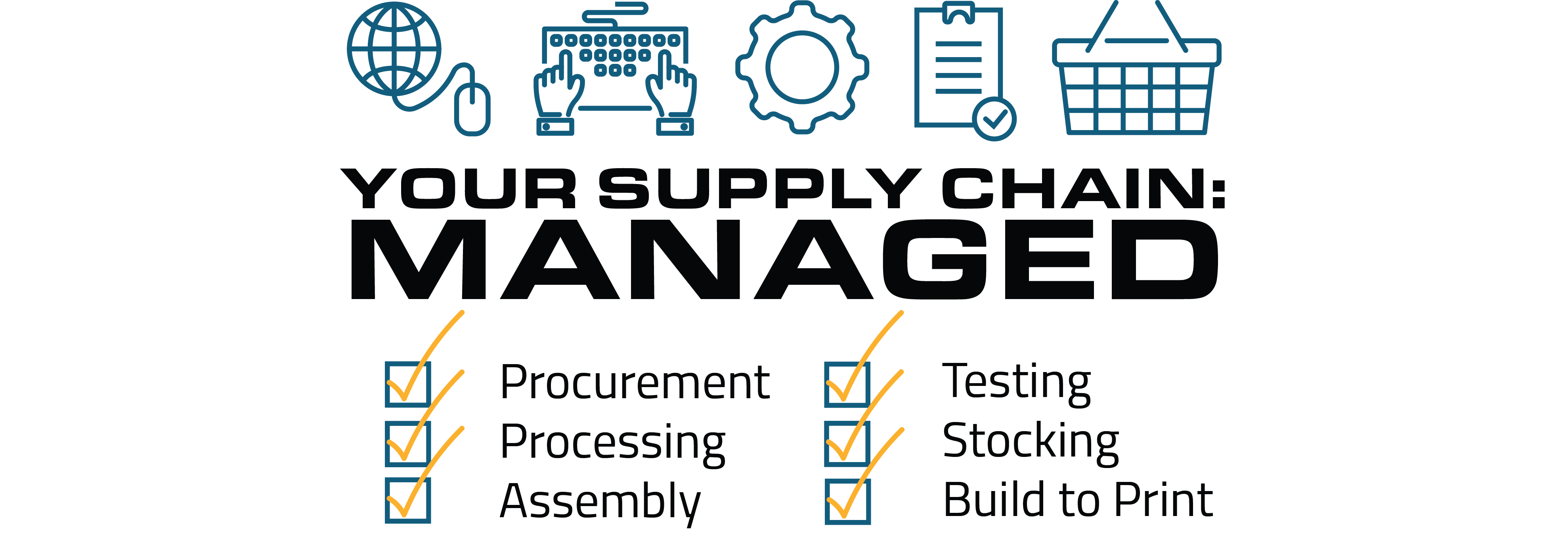
With contract manufacturing, an organization hires a manufacturer to produce assemblies or finished goods. Application engineering and design services are often included too. Think of it as a turnkey service, where the supplier can handle every step in the process from product development and production, through stocking and shipping. Rather than work with multiple vendors, the buyer deals with one trusted source that owns the entire process, handling all of the legwork.
Also known as “build to print,” we often refer to it as “supply chain management,” since the contract manufacturer is directing procurement efforts in addition to facilitating the actual production. As a result of the efficiency contract manufacturing delivers, its popularity is steadily increasing. In fact, “The global contract manufacturing market is expected to grow from $2.0 trillion in 2018 to $2.7 trillion in 2023 with a compound annual growth rate (CAGR) of 6.6% from 2018 through 2023,” according to BCC Research.
There are many advantages to choosing contract manufacturing over traditional approaches. Here are the ones we hear most often from our customers:
1) Saves Time
Let’s face it; industrial procurement is no simple task. The supply chain is complex, with many variables and suppliers involved. That means lots of searching, RFQs, emails and calls, follow-ups, etc. Not to mention all of the time it takes to analyze, compare and select a provider for each product or service. It’s tiring just thinking about it! Thankfully, this all goes away with supply chain management. Utilizing a contract manufacturer allows your procurement team to pivot, spending their time on other initiatives.
2) Increases Supplier Diversification
Many companies today are looking to diversify their supply chain. Primary reasons include reducing cost, encouraging innovation, decreasing risk, and decreasing turnaround times. When a contract manufacturer needs to outsource a service that they can’t handle in-house, they typically shop the job to 3-5 suppliers. These are often companies with whom they have a strong track record as trusted, reliable, and proven partners. This not only reduces risk, but also significantly increases the likelihood of overall success.
3) Improves Quality & Consistency
The contract manufacturer handles a job from their unique perspective as a specialist in their field, using their expertise to guide you towards the best possible outcome. Let’s take welding as an example. A buyer tends to look at welding as just the final step of a long manufacturing process. In reality, it is the most important step in the process. If a part cannot be properly welded, it will either get rejected or eventually fail. Nobody wants either to happen. When a welder handles the entire process, they focus on making sure every step guarantees optimal weldability. This often means that they will engage in designing for manufacturability. The welder will assist in refining the product design and will often make slight improvements that make a big difference in overall quality and consistency.
4) Reduces Errors (and Headaches!)
During procurement, a feature or specification becoming lost in translation causes a huge challenge. As we all know, the simplest errors on a screen or paper could lead to the biggest manufacturing headaches. When employing supply chain management, the provider aligns with experts in various fields. They understand the job, its specs and intricacies, and communicate well. Major errors are caught and corrected sooner with a team of process experts and tighter communication channels on your side.
Let’s imagine a component that requires many capabilities to produce. Multiple shops and suppliers spend valuable time and resources on the project, only to find out that in the end, the component can’t be welded due to a design flaw or manufacturing oversight. Now you’re sitting on a lot of waste, and the need to start the process all again. Not to mention, who’s paying for all this?
5) Saves Money
We saved the best for last! Thanks to the increased efficiency of the contract manufacturing process, buyers will often save money long term. Many factors contribute to these savings, including:
- Freeing up time for the procurement team allows them to better shop out and negotiate other purchases, rather than making quick, uninformed buys.
- The value-added services of product development and design often lead to saving money in the form of consolidated production steps or material subsitutions.
- Increased supplier diversification means more companies get to bid on the various aspects, often leading to more competitive pricing.
If you haven’t considered contract manufacturing, what are you waiting for? As you can see, there are many benefits to this approach. You’ll likely be surprised at what you learn in the process. But you won’t be surprised with the end result – quality components and finished goods produced using a much more efficient process.